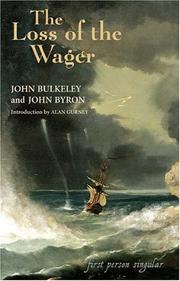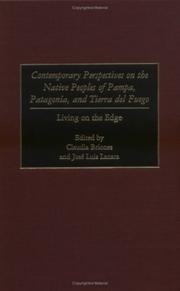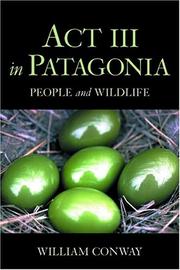| Listing 1 - 10 of 13 | << page >> |
Sort by
|
Book
ISBN: 2872460187 9782872460182 Year: 1994 Volume: *34 Publisher: Le Roeulx Talus d'approche
Abstract | Keywords | Export | Availability | Bookmark
 Loading...
Loading...Choose an application
- Reference Manager
- EndNote
- RefWorks (Direct export to RefWorks)
Patagonia (Argentina and Chile) --- Fiction. --- Fiction --- -Canales, Región de los (Argentina and Chile) --- Patagonica, Región (Argentina and Chile) --- Patagonica, Zona (Argentina and Chile) --- Región de la Patagonia (Argentina and Chile) --- Región de los Canales (Argentina and Chile) --- Región Patagonica (Argentina and Chile) --- Zona de Patagonia (Argentina and Chile) --- Zona Patagonica (Argentina and Chile) --- -Fiction --- Canales, Región de los (Argentina and Chile) --- Patagonia (Argentina and Chile) - Fiction
Book
ISBN: 9783039109173 Year: 2010 Publisher: Berlin Lang
Abstract | Keywords | Export | Availability | Bookmark
 Loading...
Loading...Choose an application
- Reference Manager
- EndNote
- RefWorks (Direct export to RefWorks)
Patagonia (Argentina and Chile) --- Patagonie (Argentine et Chili) --- Description and travel --- Discovery and exploration --- Colonization --- Biography --- Descriptions et voyages --- Découverte et exploration --- Colonisation --- Biographie --- Découverte et exploration --- Canales, Región de los (Argentina and Chile) --- Patagonica, Región (Argentina and Chile) --- Patagonica, Zona (Argentina and Chile) --- Región de la Patagonia (Argentina and Chile) --- Región de los Canales (Argentina and Chile) --- Región Patagonica (Argentina and Chile) --- Zona de Patagonia (Argentina and Chile) --- Zona Patagonica (Argentina and Chile)
Book
ISBN: 9873667423 9873667369 9873667237 Year: 2016 Publisher: Bogota : Universidad Nacional de Río Negro,
Abstract | Keywords | Export | Availability | Bookmark
 Loading...
Loading...Choose an application
- Reference Manager
- EndNote
- RefWorks (Direct export to RefWorks)
Los textos aquí reunidos buscan reflexionar acerca de algunas representaciones, discursos y prácticas que construyen el espacio denominado Patagonia. Para ello, los autores parten de marcos teórico-metodológicos diversos y transdisciplinares como los estudios subalternos, la teoría decolonial, las investigaciones de género, la ética ambiental, la geografía cultural y religiosa y el ecofeminismo. Los temas abordados son: la relación entre cultura-naturaleza como reflexión política; religiosidad de migrantes latinoamericanos en San Carlos de Bariloche; producción de territorialidad a partir de la cartografía colonial; desierto y política pública en la Patagonia.
Social Sciences, Interdisciplinary --- Social Issues --- borders --- discourse --- interculturality --- Patagonia --- representations --- space --- discursos --- espacio --- fronteras --- interculturalidad --- representaciones --- discours --- espace --- interculturalité --- frontière --- Patagonie --- représentations --- Patagonia (Argentina and Chile) --- History. --- Environmental conditions. --- Canales, Región de los (Argentina and Chile) --- Patagonica, Región (Argentina and Chile) --- Patagonica, Zona (Argentina and Chile) --- Región de la Patagonia (Argentina and Chile) --- Región de los Canales (Argentina and Chile) --- Región Patagonica (Argentina and Chile) --- Zona de Patagonia (Argentina and Chile) --- Zona Patagonica (Argentina and Chile)
Book
ISBN: 1282372564 9786612372568 3484971231 9783484971233 9781282372566 9783484550490 348455049X Year: 2009 Publisher: Tübingen M. Niemeyer
Abstract | Keywords | Export | Availability | Bookmark
 Loading...
Loading...Choose an application
- Reference Manager
- EndNote
- RefWorks (Direct export to RefWorks)
Das Ende der Welt, Weite, Wind, riesenhafte Dimensionen und kuriose Gestalten - dies sind verbreitete Topoi hinsichtlich der südlichsten Region des amerikanischen Kontinents. Gleichzeitig haben Patagonien und Feuerland Reisende wie Schriftsteller seit der europäischen ,Entdeckung' durch Ferdinand Magellan fasziniert. Die Region ist Projektionsfläche für vielfältige individuelle wie kollektive Wünsche, Fantasien und Utopien. Auf der Basis postkolonialer Literatur- und Kulturtheorien analysiert die Autorin zeitgenössische Erzähltexte aus Lateinamerika, Europa und den USA in Hinblick auf wiederkehrende Motive und Stereotype. Die Studie untersucht zudem zahlreiche intertextuelle Verflechtungen sowie die kontinuierlichen Verschiebungen zwischen ,Zentrum' und ,Peripherie'. Sichtbar wird, dass der patagonische Raum grundlegend durch die wechselseitigen, transkontinentalen Bewegungsformen zwischen Patagonien und den metropolitanen Zentren gekennzeichnet ist - Kolonisierung, Migration, Flucht, Reisen und Tourismus sind konstitutive Elemente im untersuchten Textkorpus. Den wildromantischen Imaginationen der Abenteurer steht dabei die Erinnerung an die gewaltvolle Siedlungsgeschichte gegenüber. Das Buch wurde 2009 vom Deutschen Romanistenverband mit dem Elise-Richter-Preis ausgezeichnet.
Literature. --- Belles-lettres --- Western literature (Western countries) --- World literature --- Philology --- Authors --- Authorship --- Patagonia (Argentina and Chile) --- Canales, Región de los (Argentina and Chile) --- Patagonica, Región (Argentina and Chile) --- Patagonica, Zona (Argentina and Chile) --- Región de la Patagonia (Argentina and Chile) --- Región de los Canales (Argentina and Chile) --- Región Patagonica (Argentina and Chile) --- Zona de Patagonia (Argentina and Chile) --- Zona Patagonica (Argentina and Chile) --- In literature. --- Historical novel. --- History of literature. --- Literary theory. --- Patagonia. --- Travelogues.
Book
ISBN: 1316224740 1108083412 Year: 2015 Publisher: Cambridge : Cambridge University Press,
Abstract | Keywords | Export | Availability | Bookmark
 Loading...
Loading...Choose an application
- Reference Manager
- EndNote
- RefWorks (Direct export to RefWorks)
The tale of the ill-fated HMS Wager gripped the public's imagination, feeding its taste for dramatic accounts of survival against the odds. Part of George Anson's squadron that had been sent to harass Spanish ships in the Pacific, she was wrecked after rounding Cape Horn in 1741. The majority of the survivors, led by ship's gunner John Bulkeley, mutinied against their irascible and unpredictable captain and chose to make their own way home in what would become one of the most hazardous journeys ever recorded. Their journey took them over 2,000 miles in an open boat through ferocious seas, enduring starvation and extreme privation. Two years after the disaster, the thirty remaining men arrived back in England. Bulkeley and ship's carpenter John Cummins published this account in 1743. Also reissued in this series is the 1768 account of John Byron, who had been midshipman aboard the Wager.
Voyages and travels --- Wager (Ship) --- Patagonia (Argentina and Chile) --- Chiloé (Chile) --- Chiloé, Chile (Province) --- Canales, Región de los (Argentina and Chile) --- Patagonica, Región (Argentina and Chile) --- Patagonica, Zona (Argentina and Chile) --- Región de la Patagonia (Argentina and Chile) --- Región de los Canales (Argentina and Chile) --- Región Patagonica (Argentina and Chile) --- Zona de Patagonia (Argentina and Chile) --- Zona Patagonica (Argentina and Chile)

ISBN: 1281949965 9786611949969 1846152518 1843830965 Year: 2004 Publisher: Woodbridge, Suffolk, UK ; Rochester, NY : Boydell Press,
Abstract | Keywords | Export | Availability | Bookmark
 Loading...
Loading...Choose an application
- Reference Manager
- EndNote
- RefWorks (Direct export to RefWorks)
The Loss of the Wager is an eighteenth century melodrama set in a ferociously inhospitable climate on one of the world's most remote and dangerous coastlines. The Loss of the Wager is an eighteenth century melodrama set in a ferociously inhospitable climate on one of the world's most remote and dangerous coastlines. When Commodore Anson set out for the Pacific in 1740, to attackthe Spanish ships on the Chilean coast, he took eight ships with him. The Wager was effectively a transport ship, carrying stores and a force of marines; as the squadron rounded Cape Horn in fearsome weather, she was unable to keep up with the rest of them, and with her gear wrecked by the storm, was driven ashore on the Patagonian coast. The tale of mutiny, hardship and tenacity that ensued was told by two of the survivors, John Bulkeley, leader of those who repudiated the captain's authority, and John Byron, then a midshipman, who remained with the captain. Both eventually reached home by different routes, and their dramatic narratives caught the public imagination. Byronwas the grandfather of the poet, Lord Byron, who much admired the book and based the shipwreck scenes in Don Juan on 'my grand-dad's Narrative'. This voyage was the basis for Patrick O'Brian's historical work The Unknown Shore, written before he embarked on the Jack Aubrey novels.
Shipwrecks --- Voyages and travels --- Wager (Ship) --- Chiloé (Chile) --- Patagonia (Argentina and Chile) --- Marine disasters --- Wrecks --- Adventure and adventurers --- Marine accidents --- Collisions at sea --- Canales, Región de los (Argentina and Chile) --- Patagonica, Región (Argentina and Chile) --- Patagonica, Zona (Argentina and Chile) --- Región de la Patagonia (Argentina and Chile) --- Región de los Canales (Argentina and Chile) --- Región Patagonica (Argentina and Chile) --- Zona de Patagonia (Argentina and Chile) --- Zona Patagonica (Argentina and Chile) --- Chiloé, Chile (Province) --- Chiloé (Chile) --- Chiloe (Chile)
Book

ISBN: 9873667997 9873667784 987366792X Year: 2018 Publisher: Viedma, Río Negro, Argentina : Editorial UNRN,
Abstract | Keywords | Export | Availability | Bookmark
 Loading...
Loading...Choose an application
- Reference Manager
- EndNote
- RefWorks (Direct export to RefWorks)
Esta obra busca comprender las construcciones de sentidos sociales del espacio denominado Araucanía-Norpatagonia. Y es importante destacar que los sentidos no son unívocos. En este caso, la pluralidad de lo territorial se intuye en las diferentes perspectivas de acercamiento, mostrando tanto la polisemia como las tensiones detrás de conceptos tales como espacio, frontera o representación.Para ello, los investigadores y cientistas sociales que escriben este volumen, asumen el debate centro-periferia entendiendo que la particular mirada desarrollada desde un territorio de integración tardía, como es la Patagonia tanto en Argentina como en Chile, construye una mirada epistemológica necesaria y singular.Así, la Patagonia adopta un carácter plural, las naciones se diversifican y los sentidos y prácticas de lo estatal se complejizan. Además, las territorialidades y las subjetividades forman parte de los desafíos que se abordan, reconociéndose como abiertos. This book seeks to understand the constructions of social senses of Araucanía-Norpatagonia. And it is important to emphasize that the senses are not univocal. In this case, the plurality of the territorial is intuited in the different perspectives of approach, showing both the polysemy and the tensions behind concepts such as space, frontier or representation. For this, the researchers and social scientists who write this volume, assume the center-periphery debate, understanding that the particular view developed from a territory of late integration, such as Patagonia in both Argentina and Chile, constructs a necessary and singular epistemological perspective. Thus, Patagonia adopts a plural nature, nations diversify and the senses and practices of the state become more complex. In addition, territorialities and subjectivities are part of the challenges that are addressed, recognizing themselves as open.
Humanities, Multidisciplinary --- Sociology & Anthropology --- espacio --- nación-estado --- frontera --- Patagonia --- territorio --- espace --- État-nation --- frontière --- Patagonie --- territoire --- Argentina --- borders --- Nation state --- space --- territory --- Patagonia (Argentina and Chile) --- Araucanía (Chile) --- History --- Economic conditions --- Social conditions --- Canales, Región de los (Argentina and Chile) --- Patagonica, Región (Argentina and Chile) --- Patagonica, Zona (Argentina and Chile) --- Región de la Patagonia (Argentina and Chile) --- Región de los Canales (Argentina and Chile) --- Región Patagonica (Argentina and Chile) --- Zona de Patagonia (Argentina and Chile) --- Zona Patagonica (Argentina and Chile) --- IX Región (Chile) --- Región IX (Chile) --- Novena Región (Chile) --- 9a Región (Chile) --- Araucanie (Chile)
Book

ISBN: 9874960116 9874960094 9874960507 Year: 2019 Publisher: Bogota : Universidad Nacional de Río Negro,
Abstract | Keywords | Export | Availability | Bookmark
 Loading...
Loading...Choose an application
- Reference Manager
- EndNote
- RefWorks (Direct export to RefWorks)
Este libro se ocupa de los modos en que la Patagonia es imaginada por diferentes discursos artísticos que se producen en su territorio: textos literarios, testimoniales e históricos; narraciones orales; producciones visuales y audiovisuales; así como de agencias colectivas de creación, difusión e investigación. Heterogéneos, los once artículos del volumen postulan y transitan la región como un entramado discursivo donde distintos sujetos desarrollan su potencialidad de acción y enunciación respecto de su propia historia. Porque de lo que se trata, según Luciana A. Mellado, es de repensar los significados de la Patagonia desde una pluralidad temática y disciplinar que recupere la centralidad de las experiencias situadas de creación e investigación artística, en búsqueda de la descolonización epistemológica. Así, el lector encontrará en esta obra una diversidad de lecturas que se ofrece en contrapunto a las narrativas hegemónicas sobre la Patagonia desde las coordenadas de la serie experiencia, identidad y memoria. This book deals with the ways in which Patagonia is imagined by different artistic discourses that take place in its territory: literary, testimonial and historical texts; oral narrations; visual and audiovisual productions; as well as collective creation, dissemination and research agencies. Heterogeneous, the eleven articles of the volume postulate and transit the region as a discursive framework where different subjects develop their potential for action and enunciation regarding their own history. Because what is involved, according to Luciana A. Mellado, is to rethink the meanings of Patagonia from a thematic and disciplinary plurality that recovers the centrality of the situated experiences of creation and artistic research, in search of epistemological decolonization. Thus, the reader will find in this work a diversity of readings offered in counterpoint to the hegemonic narratives about Patagonia from the coordinates of the series experience,…
Literature --- Cultural studies --- cultural studies --- Patagonia --- literary criticism --- art --- literature --- identities --- cultural field --- imaginary --- Patagonie --- littérature --- études culturelles --- critique littéraire --- identités --- domaine culturel --- imaginaire --- arte --- crítica literaria --- estudios culturales --- literatura --- imaginarios --- campo cultural --- identidades --- Patagonia (Argentina and Chile) --- In literature. --- Canales, Región de los (Argentina and Chile) --- Patagonica, Región (Argentina and Chile) --- Patagonica, Zona (Argentina and Chile) --- Región de la Patagonia (Argentina and Chile) --- Región de los Canales (Argentina and Chile) --- Región Patagonica (Argentina and Chile) --- Zona de Patagonia (Argentina and Chile) --- Zona Patagonica (Argentina and Chile)

ISSN: 15215091 ISBN: 0897898303 9780897898300 Year: 2002 Publisher: Westport (Conn.) Bergin and Garvey
Abstract | Keywords | Export | Availability | Bookmark
 Loading...
Loading...Choose an application
- Reference Manager
- EndNote
- RefWorks (Direct export to RefWorks)
Indians of South America --- Indiens d'Amérique --- History --- Social conditions --- Social conditions. --- Histoire --- Conditions sociales --- Conditions sociales) --- Patagonia (Argentina and Chile) --- Tierra del Fuego (Argentina and Chile) --- Patagonie (Argentine et Chili) --- Terre de Feu (Argentine et Chili) --- #SBIB:39A74 --- American aborigines --- American Indians --- Indigenous peoples --- Etnografie: Amerika --- Ethnology --- Canales, Región de los (Argentina and Chile) --- Patagonica, Región (Argentina and Chile) --- Patagonica, Zona (Argentina and Chile) --- Región de la Patagonia (Argentina and Chile) --- Región de los Canales (Argentina and Chile) --- Región Patagonica (Argentina and Chile) --- Zona de Patagonia (Argentina and Chile) --- Zona Patagonica (Argentina and Chile)

ISBN: 1597265896 1429495146 9781429495141 1559635185 9781559635189 9781597265898 Year: 2005 Publisher: Washington, D.C. Island Press/Shearwater Books
Abstract | Keywords | Export | Availability | Bookmark
 Loading...
Loading...Choose an application
- Reference Manager
- EndNote
- RefWorks (Direct export to RefWorks)
Animals --- Human-animal relationships --- Animal-human relationships --- Animal-man relationships --- Animals and humans --- Human beings and animals --- Man-animal relationships --- Relationships, Human-animal --- Animal kingdom --- Beasts --- Fauna --- Native animals --- Native fauna --- Wild animals --- Wildlife --- Organisms --- Zoology --- Patagonia (Argentina and Chile) --- Canales, Región de los (Argentina and Chile) --- Patagonica, Región (Argentina and Chile) --- Patagonica, Zona (Argentina and Chile) --- Región de la Patagonia (Argentina and Chile) --- Región de los Canales (Argentina and Chile) --- Región Patagonica (Argentina and Chile) --- Zona de Patagonia (Argentina and Chile) --- Zona Patagonica (Argentina and Chile)
| Listing 1 - 10 of 13 | << page >> |
Sort by
|

 Search
Search Feedback
Feedback About UniCat
About UniCat  Help
Help News
News